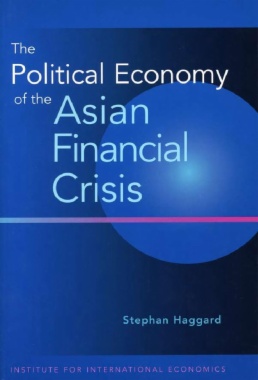The Asian crisis has sparked a thoroughgoing reappraisal of current international financial norms, the policy prescriptions of the International Monetary Fund, and the adequacy of the existing financial architecture. To draw proper policy conclusions from the crisis, it is necessary to understand exactly what happened and why from both a political and an economic perspective.
In this study, renowned political scientist Stephan Haggard examines the political aspects of the crisis in the countries most affected—Korea, Thailand, Malaysia, and Indonesia. Haggard focuses on the political economy of the crisis, emphasizing the longer-run problems of moral hazard and corruption, as well as the politics of crisis management and the political fallout that ensued. He looks at the degree to which each government has rewoven the social safety net and discusses corporate and financial restructuring and greater transparency in business-government relations. Professor Haggard provides a counterpoint to the analysis by examining why Singapore, Taiwan, and the Philippines escaped financial calamity.
The volume... provides an excellent overview of both the theories and facts of the crisis. Strongly recommended for academic collections, lower-division undergraduate through research.
- Cover
- Contents
- Preface
- Acknowledgments
- Introduction: The Political Economy of the Asian Financial Crisis
- The Debate over Causes: A Brief Intellectual History
- Bringing Politics Back In
- The Arguments in More Detail
- Ch 1 Business-Government Relations and Economic Vulnerability
- The Microeconomics of the Crisis
- Business-Government Relations: The Benefits
- The Concentration of Private Economic Power
- The Politics of Moral Hazard I: The Government and the Financial Sector
- The Politics of Moral Hazard II: Industrial Policy
- The ‘‘Capture’’ of Liberalization
- The Politics of Business-Government Relations
- Conclusion
- Ch
2 Incumbent Governments and the Politics of Crisis Management
- Political Sources of Uncertainty
- Thailand
- South Korea
- Malaysia
- Indonesia
- Conclusion
- Appendix 2.1 The Political Economy of Malaysia’s Capital Controls
- Ch 3 Crisis, Political Change, and Economic Reform
- Thailand
- South Korea
- Malaysia
- Indonesia
- Conclusion
- Appendix 3.1: Two that Got Away— the Philippines and Taiwan Compared
- Ch 4 The Politics of Financial and Corporate Restructuring
- The Political Economy of Financial Reform
- The Political Economy of Corporate Restructuring
- Liberalizing Foreign Investment
- Conclusion
- Ch
5 The Social Fallout: Safety Nets and Recrafting the Social Contract
- The Economics and Politics of Growth with Equity
- The Limits of the Model in the 1990s
- Who Got Hit?
- The Policy Response: The Political Economy of Social Policy
- Conclusion
- Ch 6 Conclusion: A New Asian Miracle
- The Political Economy of Financial Crises
- Crisis and Political Change
- Looking Forward I: The Reform of Business-Government Relations
- Looking Forward II: Toward a New Social Contract
- A New Asian Miracle
- References
- Index

